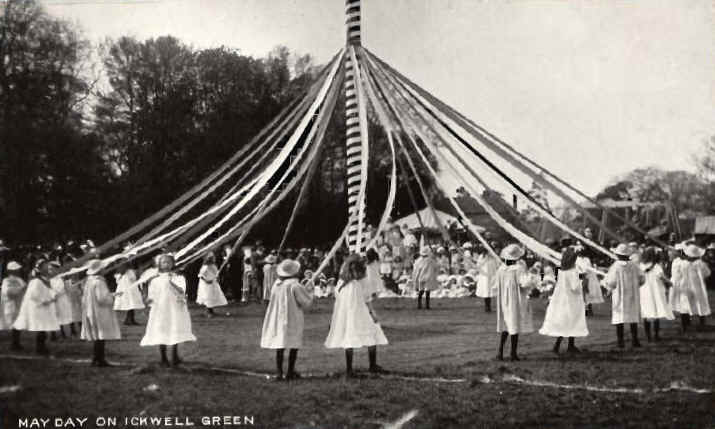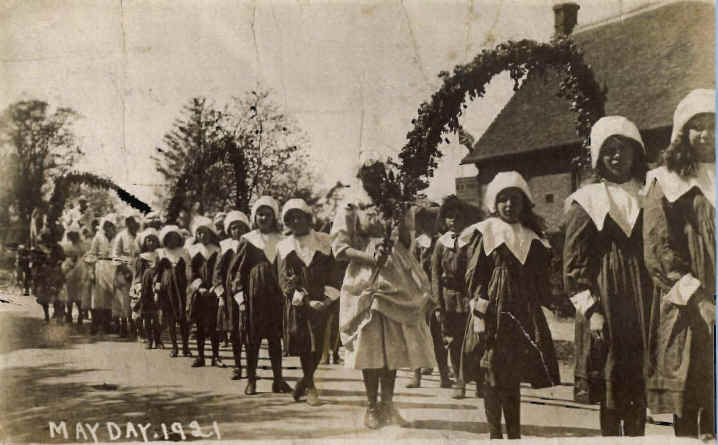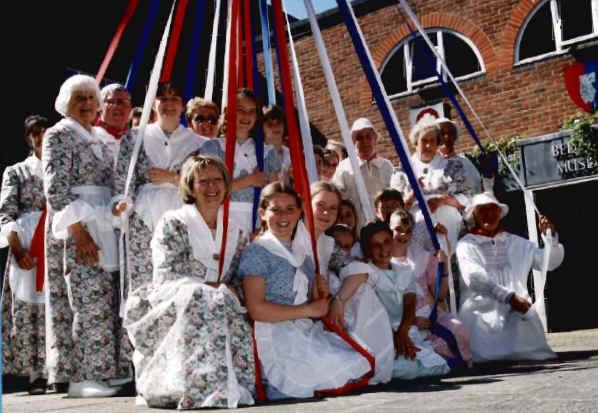History
by Rene Welch
In Celtic times, May Day was celebrated with the festival
of Beltane (the Anglicised spelling of the Gaelic god Bealtaine) whose name
meant good fire or God of Light.
Our first documented account of
celebrating the coming of spring in the Parish of Northill is to be found in the
Church Wardens' Accounts of c1565. Payments are listed for the
purchase of shoes for the dancers, of bells for the shoes, food and drink.
Payments were also made to various people for their paynes (efforts) and
to mysnstrells. It was obviously a day of feasting and dancing.

1911
It
is probable that the Church was claiming an erstwhile pagan festival for
itself. It is noted however that in 1565 Charges for the Maye were
55s 3d and a later entry gives receyts as £4 19s 4d: a pretty good
profit!
During the time of the Puritans, all such activity ceased.
However, with the return of the Monarchy, one presumes the local people once
again were able to celebrate the coming of spring with feasting and
dancing. The usual practice was to cut down a tree, often a larch, from
the forest, bring the pole to the village and set it up to be festooned with
greenery as a centre for the festivities.
Northill and Ickwell's next
documented evidence is in the latter part of the 19th century. Squire John
Harvey had a permanent maypole erected in 1872 (a ship's mast according to one
account) to celebrate the birth of his son.
He died in 1877 and left
instructions in his weill for the sum of £2 10s to be paid per annum for the
upkeep of the festival "as it has been in my lifetime". One gets
the feeling that perhaps he did not trust his villagers to get the festival
organised.

There are many anecdotes about erecting
a new pole; of the custom of 'touching the crown' and of trying to climb
it. Important to the celebrations then were the Ickwell Mayers and the
Moggies. The Mayers always had a Lord and Lady and their daemon
counterparts and associated Moggies - many with blackened faces. The group
was closely associated with Morris Dancing.

Listed
in the archives are also accounts of various customs collected by Willy Marsom
from local people.
All was about to change. In the 1880's, Professor
John Ruskin introduced a new style of May Day celebration into Whitelands
College in London. This is illustrated in The Girl's Own paper 1882 and
1889. He was inspired by what he had seen in his travels in Europe.
A Queen of May was elected and coloured ribbons attached to the pole to be woven
and plaited by the dancers. His pupils tripped out to all parts of England
into the schools and May Day as we know it was established.
Mrs Hodges, one of
these pupils, became headmistress of Northill School in 1894. Evelyn
Woodward, then living in Thomas Tompion's Cottage on the green, became our first
May Queen.
The school in the adjacent village of Caldecote has had a
half day's holiday at least since 1864 (when the school log book was started) to
go and watch the festivities at Ickwell. In 1911, they wre invited to send
a team to actually take part. Subsequently Old Warden also joined in and
it is residents from these three villages who perform the celebrations today.
In
1945, the Ickwell and District May Day Committee was formed and it is that
committee which currently organises the event.
May Day 2000 was a particularly
joyous occasion with 50 former May Queens present. The presentation of the
locket to the May Queen 2000, Stephanie Turner was made by Mrs Vera Randall, nee
Wagstaff, who had been May Queen in 1920.
What may well be unique to Ickwell
is that we have a team of adults - the Old Scholars - who dance around the
maypole. Almost without exception they are former pupils of the village
school and some of them have children and even grandchildren also performing on
the day.
Please click on the link HERE
for an article on the history of May Day Dancing, first published in Dance Today! magazine in May 2005.






